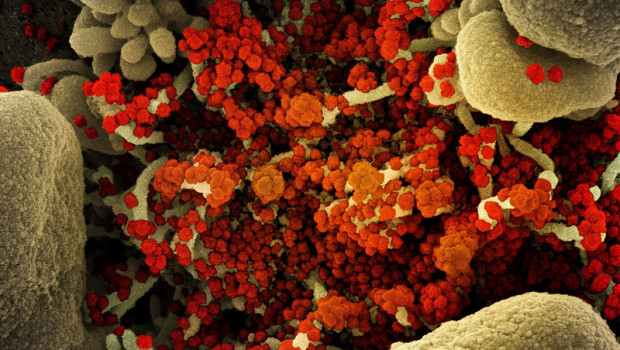New Covid variant triggers alarm bells around the world

Authorities in the UK and many other European countries moved quickly to cut travel links with South Africa and several other countries in southern Africa following the detection of a new variant of Covid-19 with a large number of mutations on the so-called 'spike' protein.
AstraZeneca
10,638.00p
16:55 03/06/25
FTSE 100
8,787.02
17:09 03/06/25
FTSE 350
4,816.29
17:14 03/06/25
FTSE All-Share
4,766.13
17:14 03/06/25
MODERNA
$27.81
12:24 03/06/25
Pfizer Inc.
$23.35
11:04 03/06/25
Pharmaceuticals & Biotechnology
20,989.28
17:14 03/06/25
The fear was that the large number of mutations might make the virus more transmissible and allow it to better evade vaccines.
Saijd Javid, the Secretary of State for Health and Social Care, told MPs: "We are concerned that this new variant may pose substantial risk to public health.
Although he conceded that there was no hard data yet, he went on to add: "Early indications show this variant may be more transmissible than the Delta variant, and current vaccines may be less effective against it. It may also impact the effectiveness of one of our major treatments, Ronapreve."
The variant, which had been classified as B.1.1.529, had roughly 50 mutations, including 30 on the spike protein and 10 on its receptor, Guillermo Martínez de Tejada, a professor of Microbiology at the University of Navarre, told Spanish daily ABC.
Tests to determine just how transmissible and dangerous the variant was were expected to take at least two weeks.
Martínez de Tejada highlighted that the new variant, which was expected to be dubbed 'Nu' by the World Health Organisation, had become the predominant strain in Gauteng, South Africa's smallest province, in just two weeks.
The thinking in financial markets appeared to be that, perhaps because of that, authorities in the UK, Germany, Italy and Spain had moved so quickly to impose restrictions on travel from South Africa and some of the neighbouring countries.
South African officials first reported the new strain on 23 November after a worrying number of mutations were found in samples taken between 14-16 November.
To the credit of South African scientists, the first full sequencing of the new variant's genome had been completed less than two weeks before, on 11 November.
Some observers believed it very possible that the new variant came about by the infection of a person whose immune system was depressed, possibly from AIDS.
Roughly 8.2m South Africans had been diagnosed with AIDS, out of a total population of approximately 60m, with the same virus highly prevalent in other countries on the same continent.
Nevertheless, some reports indicated that vaccines were piling up unused due to a lack of demand, even though according to Oxford University´s Our World In Data only 23.51% of South Africans were fully vaccinated against Covid-19 with another 4.57% only partly vaccinated.
A first case of the new variant was detected in Belgium on 22 November, and confirmed on Friday, in a young unvaccinated woman who had recently travelled to Egypt, via Turkey, and who had experienced flu-like symptoms around 11 days after her return.
She reportedly had not been infected with the virus previously either and did not experience severe symptoms.
In remarks to Radio 4, Dr. Susan Hopkins, the UK Health Security Agency's chief medical officer, said the number of relevant mutations in the new variant were 30, twice as many as in the Delta variant, adding that it was the "most worrying" variant seen to date.
Hopkins said the government's response was meant to give the UK a chance "to grow the cultures and test those questions about vaccines and treatments against it."